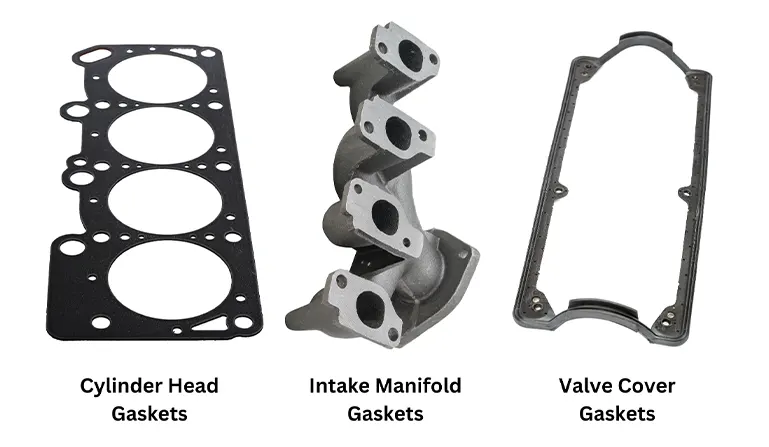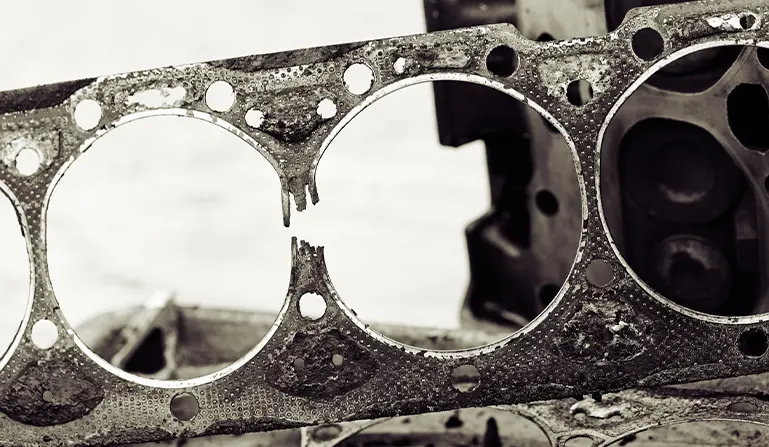Engine gaskets act as a seal between two surfaces, preventing leakage of oils and gases. Maintaining gaskets in good condition is essential for the overall performance of the engine.
This article covers the importance of engine gaskets and tips on maintaining them.
Types Of Engine Gaskets
There are two main categories of gaskets in a vehicle. The cylinder head gasket and specialty gaskets such as manifold gaskets, oil pan gasket, and pump gasket.
Metals is the mostly used material in manufacturing gaskets, while other types of gaskets, such as, elastometric gaskets, composites gaskets are also available in the market.
- Cylinder Head Gaskets: The cylinder head gasket acts as a seal between the engine block and the cylinder head.
- Intake Manifold Gaskets & Exhaust Manifold Gaskets: Intake and exhaust gaskets seal the intake and exhaust manifolds, preventing leaks.
- Water Pump Gaskets: These gaskets seals the water pump, so as to prevent the leakage of coolant.
- Oil Pan Gaskets: Oil pan gaskets seal the oil pan.
- Valve Cover Gaskets: A valve cover gasket seals the valve cover to the top portion of the engine cylinder head, preventing the leakage of oil.
The below infographic shows the selected types of gaskets.

Understanding The Role Of Car Engine Gaskets
Engine gaskets are integral components that ensure the optimal performance and longevity of a vehicle’s engine.
Their primary functions include:
Sealing Function
Gaskets provide a tight seal between two surfaces, preventing the leakage of vital fluids and gases. This ensures that the engine operates efficiently without any loss of performance.
Prevents contamination
By acting as a barrier, gaskets protect the engine from external contaminants such as dirt and debris. This ensures that the engine remains clean and functions optimally.
Maintaining Proper Engine Temperature
Gaskets play a role in regulating the engine’s temperature. They facilitate the flow of coolant and oil, ensuring that the engine doesn’t overheat and operates within its optimal temperature range.
Vibration Absorption
Engines produce vibrations during their operation. Gaskets help in absorbing these vibrations, ensuring a smoother engine performance and reducing wear and tear on engine components.
Further, engine gaskets are more than just sealing components; they are crucial for the overall health and performance of the engine. Proper care and timely replacement of these gaskets can significantly enhance the lifespan and efficiency of a vehicle’s engine.
How And Why Engine Gasket Fails?
Engine gaskets are crucial components that ensure the optimal functioning of a vehicle’s engine.
However, like all parts, they are susceptible to wear and tear and can fail due to various reasons:
1. Age and Wear Over Time
As with most materials, engine gaskets degrade over time. Continuous exposure to high temperatures and pressures can cause them to become brittle, cracked, or eroded.
Aged or worn-out gaskets can lead to leaks, reducing the efficiency of the engine and potentially leading to more significant engine problems if not addressed promptly.
2. Overheating
Gaskets can warp or shrink when exposed to excessive heat. Overheating can be a result of issues like a malfunctioning radiator, blocked coolant passages, or a faulty thermostat.
Warped or shrunken gaskets can lead to fluid leaks, which can further exacerbate the overheating issue, creating a vicious cycle of engine damage.
3. Contamination
Gaskets can be compromised by contaminants such as oil, coolant, or other substances. This can degrade the material of the gasket, making it less effective.
Contaminated gaskets can lead to poor sealing, resulting in leaks and reduced engine performance.
4. Poor Installation
If gaskets are not installed correctly or if the wrong type of gasket is used, it can lead to improper sealing.
Incorrectly installed gaskets can result in leaks, which can cause a range of engine problems, from reduced performance to significant damage.
5. Excessive Engine Pressure
Engines that operate at high compressions or those modified for enhanced performance can exert additional stress on gaskets.
The added pressure can lead to premature gasket failure, resulting in leaks and potential engine damage.
6. Poor Engine Maintenance
Regular engine maintenance is crucial for its longevity. Ignoring signs of problems, such as low coolant levels or a malfunctioning cooling system, can lead to issues like overheating.
Neglecting engine maintenance can result in a cascade of problems, with the head gasket failure being one of the severe consequences.
What are the Signs of a Failing Engine Gasket?
Engine gaskets play a pivotal role in ensuring the smooth operation of a vehicle’s engine. Recognizing the signs of a failing gasket is crucial to prevent further engine damage.
Here are the common symptoms and their detailed explanations:
Engine Overheating
The engine’s coolant system relies on a sealed environment to function correctly. A blown head gasket can lead to a reduction in coolant levels, causing the engine to overheat.
Overheating can cause significant engine damage, including warping of engine components and potential breakdowns. Regularly monitoring the temperature gauge and ensuring the coolant is at the recommended level can help in early detection.
Engine Oil Leaks
Gaskets act as barriers between different engine components. When they fail, oil can seep out, leading to visible leaks.
Oil leaks can lead to reduced lubrication, causing increased friction and wear on engine parts. If you notice oil spots under your car or a decrease in oil levels, it’s essential to address the issue promptly.
Engine Coolant Leaks
Similar to oil leaks, a compromised gasket can also lead to coolant leaks. This can be evident from greenish (or other colored) puddles under the vehicle.
Coolant leaks can result in the engine overheating due to reduced coolant levels. Regularly checking the coolant reservoir and being vigilant about unusual puddles can help in early detection.
Poor Engine Compression
Engine gaskets ensure optimal compression within the engine cylinders. A failing gasket can lead to reduced compression, affecting the engine’s performance.
Symptoms of poor compression include decreased engine power, reduced fuel efficiency, and difficulty in starting the vehicle. These signs indicate potential gasket issues and warrant an immediate check.
If you experience any of these symptoms, it is important to have your engine inspected and repaired as soon as possible to prevent further engine damage.
What Is The Blown Head Gasket?
A blown head gasket often evokes concern among both car enthusiasts and everyday drivers. A failure or “blow” in this gasket can trigger a range of engine issues, from simple leaks to significant engine damage.

Several factors can lead to the failure of a head gasket. Overheating stands out as the most prevalent cause. When the engine becomes excessively hot, the cylinder head might warp, exerting added pressure on the head gasket, which can then lead to its failure.
Another cause is engine detonation, where irregular combustion events, commonly referred to as “knocking,” exert undue stress on the gasket. Additionally, like all components, the gasket material is subject to age and wear. As time progresses, this material can degrade, diminishing its sealing effectiveness.
Fixing a Blown Head Gasket: Steps to Recovery
Addressing a blown head gasket is crucial to prevent further engine complications. Here’s a general approach:
- Diagnosis: If you suspect a blown head gasket, it’s essential to get a professional diagnosis. Common symptoms include white smoke from the exhaust, milky oil, and overheating.
- Stop Driving: If the head gasket is blown, it’s crucial to stop driving the vehicle immediately to prevent further damage.
- Repair or Replace: Depending on the extent of the damage, the head gasket may need to be replaced. This process involves disassembling the top part of the engine, replacing the gasket, and then reassembling. In some cases, if the damage is extensive, it might be more cost-effective to replace the entire engine.
- Preventative Measures: After fixing, ensure regular maintenance to prevent future issues. This includes regular oil changes, maintaining coolant levels, and ensuring the cooling system is functioning correctly.
Can You Drive With A Blown Head Gasket?
If you neglect to repair a blown head gasket, coolant and gases can escape from one surface to the other and it will cause damage to your engine. Therefore, you need to get a certified mechanic to inspect your gasket.
Best Gasket Producing Brands
The following are the key players in the automotive gaskets market,
- Dana Incorporated
- ElringKlinger
- Talbros
- DRiV Inc.
- Tenneco Incorporated
- Nichias Corporation
- Datwyler Sealing Solution USA Inc
- Freudenberg Group
- Uchiyama Manufacturing Corporation
- Yantai Ishikawa Sealing Technology
- Nippon Gasket
- Kokusan Parts Industry Company Limite
- Nippon Leakless Corporation
Conclusion
Engine gaskets are vital for optimal vehicle performance, preventing fluid leaks and maintaining engine pressure. However, they can degrade over time due to factors like overheating. Recognizing early signs of failure is crucial.
Top brands in the market, such as Dana Incorporated and ElringKlinger, ensure quality gaskets, emphasizing the importance of regular maintenance for longevity.

John Smith, a Los Angeles-based car specialist and automotive writer, boasts over 20 years in the industry. With a background as a master technician and a decade-long writing stint at notable automotive publications, John now shares his expansive knowledge on CarFinite, simplifying car maintenance for readers.

